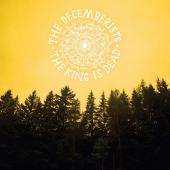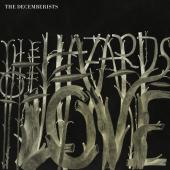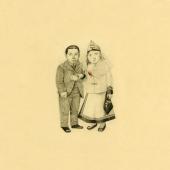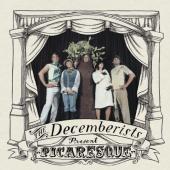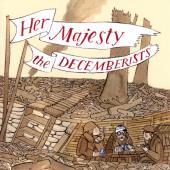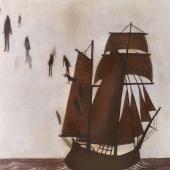There’s an odd bond between the music of the British folk revival and classic metal," says The Decemberists frontman Colin Meloy. "A natural connection between, like, Fairport Convention and Black Sabbath—of course, Sandy Denny from Fairport even sang with Led Zeppelin on ‘The Battle of Evermore.’ I think there’s a shared sense of narrative and ambience, of moving beyond the first person in your writing. And I thought it would be interesting to mess around with that.
"
The band’s fifth album, The Hazards of Love, represents the most glorious kind of messing around. It’s the most ambitious and most accomplished project to date from the Portland-based quintet of Meloy, Chris Funk, Jenny Conlee, Nate Query, and John Moen—a full-length song cycle rooted in ancient language and imagery, yet entirely modern and accessible. The follow-up to the group’s 2006 breakthrough, The Crane Wife (which NPR listeners voted their favorite album of the year), The Hazards of Love solidifies the Decemberists’ standing as one of the most innovative and important creative forces in music today.
The album began when Meloy—long fascinated by the British folk revival of the 1960s—found a copy of revered vocalist Anne Briggs’s 1966 EP, titled The Hazards of Love. Since there was actually no song with the album’s title, he set out to write one. Soon, though, he was launched into something much larger than just a new composition.
"It grew into the idea of creating a suite of songs based on old folk songs," says Meloy. "Building a narrative, piecing together disparate motifs, developing actual protagonists." Of course, working with elaborate song forms isn’t new territory for the Decemberists. As far back as 2004, the band released "The Tain," an eighteen-and-a-half minute single based on an Irish myth. The Crane Wife took as its starting point an ancient Japanese folk tale, which was interpreted across three separate songs. The album climaxed with "The Island," a 13-minute, three-section murder ballad.
"I wanted to continue to experiment with songs with longer, extended themes," says Meloy. "This album is really an expansion of the ideas from the earlier stuff."
Our story begins, in classic form, with a journey, on the gentle, moody "Hazards of Love 1 (The Prettiest Whistles Won’t Wrestle the Thistles Undone)"—offering, as Meloy puts it, the centuries-old theme of "the danger of the woods versus the safety of the house." With that first step taken, he says, the tale’s direction "emerged in front of me."
The album’s first half was written in order, one song after another. "Then it got harder, once I was imposing a narrative on it," says Meloy. "It’s fun to toy with little suites when you don’t have to fully develop them, but I’m used to keeping things open-ended."
In its final, 17-song form, The Hazards of Love (produced by Tucker Martine) tells the tale of a woman named Margaret who is ravaged by a shape-shifting animal; her lover, William; a forest queen; and a cold-blooded, lascivious rake. The range of sounds reflects the character’s arcs, from the accordion’s sing-song lilt in "Isn’t It a Lovely Night?" to the heavy metal thunder of "The Queen’s Rebuke/The Crossing." Melodies echo across different songs—"The Abduction of Margaret" mirrors "A Bower Scene."
Meloy points out that his bandmates were entirely supportive of him chasing this daunting vision. "All along, everybody has been very sweet about humoring me and my whims," he says. "There was an extra charge in the studio—everyone was really just up for the challenge."
The album’s language is intricate, often archaic, without feeling labored. ("Wasn’t it a lovely breeze/That swept the leaves of arbor eaves/And bent to brush our blushing knees?," sings Meloy on "Isn’t It a Lovely Night?") But Decemberists fans have a context for this approach: Earlier efforts, like 2003’s Her Majesty the Decemberists or 2005’s Picaresque, were characterized by fantastical songs full of sea captains, legionnaires, and chimney sweeps.
One triumph of The Hazards of Love is that it’s just as compelling to listen to whether or not you’re following the story
line. "It’s a rock record—you’re supposed to fill in the blanks a little," says Meloy. "There should be stuff that’s more abstract and left to interpretation. So you can come to it without knowing the narrative, or you can pull out the lyric sheet and try pull it all together."
A host of guests are featured on the album, giving it additional texture and even more of a
theatrical feel. Lavender Diamond's Becky Stark and My Brightest Diamond's Shara Worden deliver the lead vocals for the female characters, while My Morning Jacket's Jim James, Robyn Hitchcock, and the Spinanes' Rebecca Gates appear in supporting roles.
The Decemberists plan to tour in the spring, playing The Hazards of Love straight through for the show’s first half and older material for the remainder. "It’s intended to be performed all in one piece, but it’s not meant to be acted out," says Meloy. "There’s the voices and the lyrics, and you should be able to draw the narrative from that." (This is a band that doesn’t shy away from major stage production, having performed The Crane Wife with full orchestral accompaniment on several dates in 2007, including a stop at the historic Hollywood Bowl with the Los Angeles Philharmonic.)
"This album is the apotheosis of my obsession with British folk songs," says Colin Meloy. "I’ve been toying with it for so long, I really needed to get this done. Doing The Hazards of Love took a lot out of me. And I’m definitely curious what will come out now that I’ve got this out of my system."
something extra:
Source: http://www.decemberists.com/bio.html
"I'm a poor, drunken orphan with nowhere to go but the grave," wailed a waifish and non-plussed Mr. Chris Funk as he lay supine by the railroad tracks. The crate of records he had been cradling in his nubile appendages now lay in pieces on the ashen ground, his complete collected recordings of sixties psychedelic luminary Rick "Paisley Dave" Rigmore scattered hit her and yon like so many dead leaves beneath a diseased elm. Noting his neglect to accredit this phrase to its rightful owner, chief engineer Jenny Conlee, her accordion neatly strapped to her back, stepped lightly from the caboose and corrected his negligence with the aplomb only an immigrant Hungarian could muster: "Dylan Thomas, sir! Please move along!" But it was too late: an indelible bond had been soldered in that moment of recognition. A few hours later, in a Turkish bath, they revealed their stories to one another between sips of a strange, tangerine liqueur. Not far from that spot, however, two young military dignitaries (Rachel Blumberg, Nate Query), appropriately lathered, overheard our two heroes' stories. Was it chance, then, that lead the four unsuspecting bathers to seek to return their soiled undergarments at the same kiosk where worked the poor, bespectacled Colin Meloy? One can surmise all one wants, but the truth should be known that, after adopting the moniker The Decemberists, these five wan vagabonds began playing their peculiarly styled pop music in various venues all across the greater northwest, even going so far as to release a full length record in June of 2002, entitled Castaways and Cutouts, on Portland's own Hush Records, a record which will see its second release on Kill Rock Stars on May 6th, 2003.


